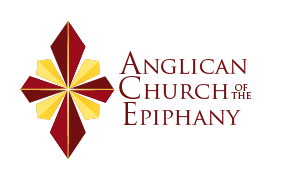As Fr. Greg preached last week, the Anglican tradition celebrates the sainthood of all Christians as well as honors particular saints who, by God’s grace and power, built up the church through faithful devotion to God. All Saints Day, then, is a feast commemorating all the saints we honor throughout the year in addition to all the saints of Christ’s church. The reading from Ecclesiasticus (offered as an option for today’s reading) models for us the remembrance of both the great— those of prominence who “ruled in their kingdoms” or “spoke in prophetic oracles”— as well as those whose memory fades into the fabric of time (Eccl. 44:3). Even though these faithful have “become as though they had never been born” the singer from Ecclesiasticus declares that “these also were godly men, whose righteous deeds have not been forgotten” (44:9-10). For even if the memories of their faith and virtue have passed away here on earth, God has certainly not forgotten those righteous deeds done in his name. All Saints Day prompts us to remember the faithful and examine our own lives in light of their obedience.
This resource includes a brief reflection on the Eucharistic lectionary readings assigned for All Saints. Lectionary Readings & Reflection
Revelation 7:9-17
Psalm 149
Ephesians 1:11-23
Luke 6:20-36
Today’s Eucharistic lectionary readings draw from rich and complex passages of Scripture— each deserving of their own rigorous reflection. However, taken together, these passages prompt us to consider Christ’s victory in and through the lives of his people. As the description of the multitude before the throne of God in Rev. 7 most clearly represents this sense of victory, we’ll focus our attention here allowing the other lectionary readings to inform and fill out our understanding.
St. John writes, “After this I looked, and behold, a great multitude that no one could number, from every nation, from all tribes and people and languages, standing before the throne and before the Lamb, clothed in white robes, with palm branches in their hands, and crying out with a loud voice, ‘Salvation belongs to our God who sits on the throne, and to the Lamb!’” (Rev. 7:9-10)
Having just received a vision of the 144,000 sealed by God on earth, St. John receives a vision of heaven in which he sees a “multitude” beyond numeration. The emphasis on both the greatness and diversity of the multitude echoes God’s promises that he would make Abraham into a great nation and that all the nations of the earth would receive blessing through him. If the children of faith are the true children of Abraham as St. Paul the Apostle claims in Romans, then this vision of the innumerable multitude is a kind of heavenly fulfillment of God’s promise. Furthermore, the Christ, coming through Israel, has brought the blessing of salvation to all people. Dressed in white robes symbolic of victory and waving palm branches in triumph, the throng declares the victory of God and the Lamb before prostrating in worship saying, “Amen! Blessing the glory and wisdom and thanksgiving and honor and power and might be to our God forever and ever! Amen!” (7:11-12).
An elder then addresses St. John, identifying the multitude and where they come from: “These are the ones coming out of the great tribulation. They have washed their robes and made them white in the blood of the Lamb.” (7:14).
There are a variety of ways to interpret “the great tribulation,” but regardless of whether we interpret this “great tribulation” to refer to a specific persecution or the oppression and persecution of Christ’s people experienced throughout all history, two things remain true: first, that all Christians, by virtue of belonging to Christ and not the world, will experience some degree of tribulation, persecution, and oppression (John 15:18-20), and second, that these who are coming out of the great tribulation are a victorious multitude. Thus, this multitude having suffered on earth— whether in a particular or universal persecution— can represent the life of all who are victorious in Christ.
Our Gospel reading from St. Luke briefly describes what these tribulations may look like and provides instruction on how we who are in Christ ought to respond: “Love your enemies” and “do good to those who hate you” (Lk. 6:27). Jesus reasons, “If you love those who love you, what benefit is that you? For even sinners love those who love them. And if you do good to those who do good to you, what benefit is that to you? For even sinners do the same” (6:32-33). Those who are in Christ, however, being empowered by the Spirit of God, receive the power to love those who “curse,” “abuse,” and “strike” them. The victory of the saints, then, is an extension of the victory of God.
The elder in Revelation continues, illustrating the heavenly victory, or the “inheritance” (to gesture to St. Paul’s Epistle to the Ephesians) of those who are in Christ:
“Therefore they are before the throne of God,
and serve him day and night in his temple;
and he who sits on the throne will shelter them with his presence.
They shall hunger no more, neither thirst anymore;
the sun shall not strike them,
nor any scorching heat.
For the Lamb in the midst of the throne will be their shepherd,
and he will guide them to springs of living water,
and God will wipe away every tear from their eyes.” (Rev. 7:15-17)
Laden with echoes from other passages of Scripture, this song begins by emphasizing how the saints dwell in the continuous presence of God. Whereas temple worship began and ended each day, the heavenly multitude serves God day and night. Here, in the continual presence of God, the saints shall no longer suffer hunger, thirst, or physical suffering. Now, the Lamb who was slain has become the shepherd, who leads his flock to “springs of living water” and comforts his people, removing each tear from their eyes. Jesus’ declaration of blessing for those who have suffered in the Gospel of Luke is fulfilled (Lk. 6:20-22). Those who were poor, hungry, grieved, and reviled are here satisfied and comforted by the Lamb, who is their shepherd.
The psalm appointed for All Saints leads us to respond to what we have read in Revelation with praise and thanksgiving. For not only does the psalm exhort us to “praise,” “sing,” and “rejoice,” but summarizes the relationship between God and his people:
“For the LORD has pleasure in his people
and gives victory to those who are oppressed.” (Ps. 149:4)
Therefore, we praise God for giving us victory through the cross from the oppression of sin; we praise him for the victory he has given to his saints who have persevered in faith and suffered all manner of tribulation in obedience to Christ; and we praise him for the victory he will give to us by his power and grace that we too might triumph in faith.
Let us conclude by dwelling on St. Paul’s prayer for the Ephesians:
“…because I have heard of your faith in the Lord Jesus and your love toward all the saints, I do not cease to give thanks for you, remembering you in my prayers, that the God of our Lord Jesus Christ, the Father of glory, may give you the Spirit of wisdom and of revelation in the knowledge of him, having the eyes of your hearts enlightened, that you may know what is the hope to which he has called you, what are the riches of his glorious inheritance in the saints, and what is the immeasurable greatness of his power toward us who believe…” (Eph. 1:15-19)
Paul prays that the Ephesians, having received the Holy Spirit who enlightens our hearts, will know three things: first, the hope to which he has called you, second, the riches of his glorious inheritance, and, third, the immeasurable greatness of his power.
Our hope is for the victory of Christ in our lives, a hope that we may cultivate by seeing the victory of Christ in the lives of his saints. Our glorious inheritance, as illustrated in Revelation, is the presence of the Lamb himself, a presence which is already available to us in the Holy Eucharist, but which we shall enjoy continually in heaven. Finally, our victory in faithfulness reveals not our own power or spiritual excellence, but the “immeasurable greatness” of God’s power working in us to overcome and conform to the life of Christ in whom we have salvation.
Collect for All Saints
Take a minute to pause after reading the collect for All Saints and consider its meaning in light of the Scriptural readings. The collect for All Saints may be found on p. 633 of the BCP (2019) or below:
Almighty God, you have knit together your elect in one communion and fellowship in the mystical Body of your Son: Give us grace so to follow your blessed saints in all virtuous and godly living, that we may come to those ineffable joys that you have prepared for those who truly love you; through Jesus Christ our Lord, who with you and the Holy Spirit lives and reigns, one God, in glory everlasting. Amen.
Celebrating All Saints
Below are suggestions of additional ways you can observe All Saints individually, with your family, or with a friend.
Take time to consider the Christians who have been important to your own faith and formation. As you reflect on these individuals and how they blessed your life with the presence of God, offer a prayer of thanksgiving to God for bringing them into your life. You might even consider writing a brief note of gratitude to someone.
Peruse the Calendar of Holy Days and Commemorations beginning on p. 691 of the BCP (2019) and take a few minutes to learn about one of the saints whose story is unfamiliar to you. Consider: How did this saint uniquely model Christ-likeness? Where in my life can I embody this virtue more fully?
Learn a new hymn; some appropriate suggestions are listed here:




